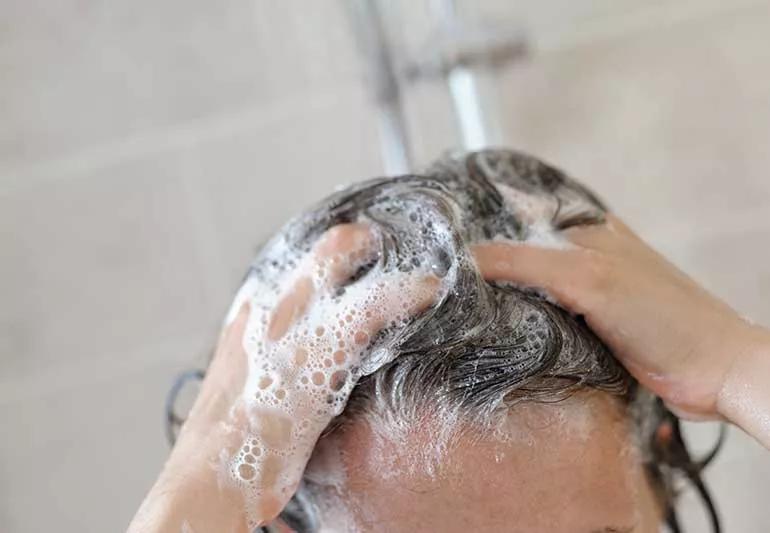They can’t treat the cause of your hair loss, but some ingredients are better than others

Image content: This image is available to view online.
View image online (https://assets.clevelandclinic.org/transform/467d1fbb-d7eb-4428-9228-293acf8e3bc5/Shampoo-Hairloss-157569558-770x533-1_jpg)
person shampooing hair in shower
The writing is on the wall and down your shower drain: You’re losing more hair than usual, and you want it to stop. You have a friend that swears by a trendy shampoo line, but can any shampoo help with hair loss?
Advertisement
Cleveland Clinic is a non-profit academic medical center. Advertising on our site helps support our mission. We do not endorse non-Cleveland Clinic products or services. Policy
Dermatologist Melissa Piliang, MD, says don’t believe the hype. “You can buy shampoos that are better or worse for your hair, but none treat hair loss. Shampoo companies may make that claim, but there have been at least two big class-action lawsuits against those that have.”
Dr. Piliang explains what you should do if you’re experiencing hair loss, which shampoo ingredients may have an impact and which ingredients to avoid.
“It’s normal to lose 100 to 200 hairs each day,” Dr. Piliang explains. “But if you notice you’re losing more, your first step should be calling your healthcare provider.”
When hair loss is significant, you may also notice your:
“When you experience hair and scalp problems, dermatologists have the knowledge and training to help,” she continues. “Waiting for a new shampoo to kick in will just delay care. You want to get a good workup from your provider so you can identify the problem and the best treatment options.”
You could be losing too much hair for many reasons, including:
Advertisement
While there aren’t any shampoos that will treat the cause of your hair loss, there are shampoos you can choose that won’t intensify the problem. If you’re experiencing hair loss, pick a shampoo that’s moisturizing and includes the ingredient ketoconazole.
While it may not save every strand, shampoo does impact your overall hair and scalp health. “I commonly see people who think their hair is shedding when it’s really breaking. That breakage is often related to their hair care regimen. For example, harsh shampoos can cause damage,” notes Dr. Piliang. “That’s why you should wash your hair with a moisturizing shampoo. And if you’re using a lot of hot rollers, straightening or curling irons, or a super-hot hair dryer, stop.”
She adds that a good shampoo doesn’t have to break the bank either. There are many cost-effective choices at your local drugstore. Just look for a reputable brand that includes moisture-promoting ingredients. These ingredients include humectants like glycerin, and oils like argan oil and jojoba oil.
And don’t skimp on conditioner, especially if you have hair past your ears. “Conditioner protects your hair from all the things that you do to it, including brushing, using heat on it and exposing it to wind and sun,” she says.
Some anti-dandruff shampoos include ingredients like ketoconazole, zinc pyrithione and piroctone olamine. Healthcare providers often recommend these shampoos to treat dandruff and scalp psoriasis. But they could be pulling double duty for your hair.
“While ingredients like ketoconazole may not prevent hair loss, some evidence suggests that using them may help improve hair health,” explains Dr. Piliang. “These kinds of shampoos help prevent and treat inflammation. They also kill a dandruff-causing yeast that lives on the scalp called pityrosporum (Malassezia). Hair loss isn’t just about your hair fibers. It’s about scalp health, too. If your scalp isn’t healthy, it can’t produce healthy hair.”
When hair loss is a concern, Dr. Piliang recommends avoiding shampoos with these ingredients:
Advertisement
You have to think long term when it comes to hair health. While some shedding is inevitable, using a moisturizing shampoo and conditioner can strengthen your hair. But when hair loss seems to accelerate, team up with a dermatologist to understand why — and what you can do about it.
Advertisement

Sign up for our Health Essentials emails for expert guidance on nutrition, fitness, sleep, skin care and more.
Learn more about our editorial process.
Advertisement
Take steps to reduce stress by practicing meditation, finding time to relax and maintaining a healthy lifestyle
You may see pitting, brittleness or ridges in your fingernails and toenails
Your immune system may attack hair follicles anywhere on your body
It’s normal to lose around 50 to 150 strands per day to routine hair shedding
Studies are mixed, but frequently wearing very tight, warm hats could stress your follicles and lead to hair loss
Things like stress, heated styling and other health conditions may cause you to lose more hair than normal
Creatine does cause some side effects, but hair loss probably isn’t one of them
A gentle hair care routine, stress reduction and sun protection can help reduce flares and maintain your locks
Prioritize your health by managing stress, strengthening your social connections and getting quality sleep
Bolsters, blankets, pillows and blocks can offer extra support, stability and comfort
Allergies, postnasal drip, asthma or reflux could be to blame for a cough that won’t quit